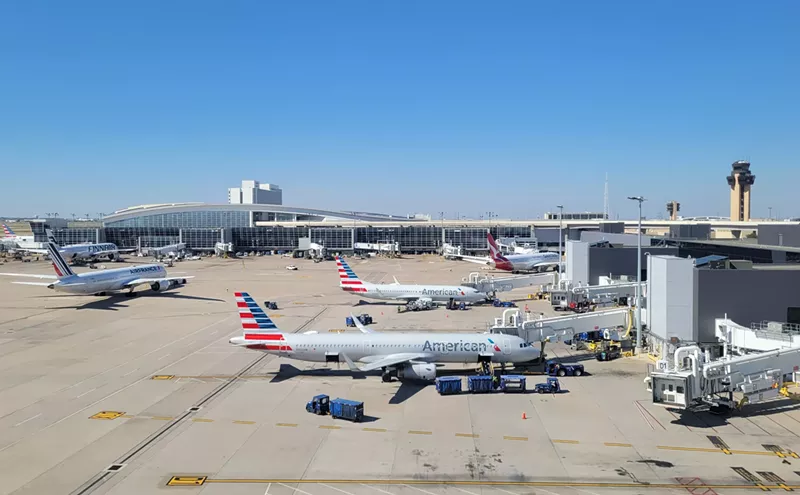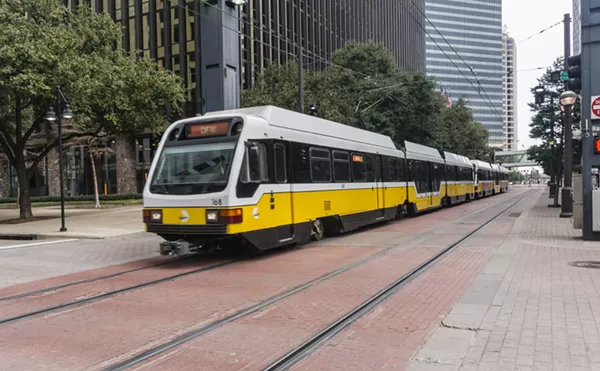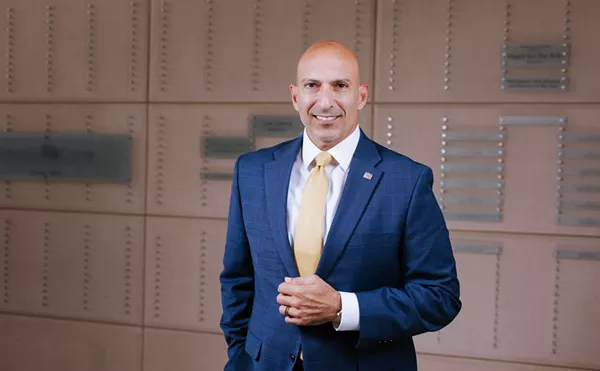I will put my bleeding heart up next to anybody's bleeding heart. Community activist and blogger Sharon Boyd once told me, "Schutze, you're so liberal you won't even take your own side in an argument."
I favor most forms of affirmative action, especially where minority contracting is concerned. Tell me any of that stuff about how the white boys used to carve up the pie for themselves at the country club: I believe it all. To me it's extremely important to open the doors, break down the barriers and create a level playing field.
But even on a level playing field you have to know what the damn game is.
For the last three years Dallas County Commissioner John Wiley Price has been brow-beating a major investor and developer in Southern Dallas over something Price calls variously "equity" or "minority investment opportunity" in the developer's company.
That company, The Allen Group of San Diego, can't get a straight answer about what either of those terms means. I have had several conversations myself with Commissioner Price, trying to get him to tell me. I get the same thing from him that The Allen Group does—a lot of talk, a lot of vehemence, a lot of vagueness.
Ominous vagueness.
The Allen Group has amassed 6,000 acres of land in southern Dallas and Dallas County for a project promising to bring more than 60,000 new well-paid jobs to a severely depressed area. It is the prime developer of what is being called the southern Dallas inland port—a vast rail, trucking and warehousing center that could transform economically blighted South Dallas into one of the nation's primary shipping hubs. I have written about this deal several times, twice in the last 30 days. I hope I'm not getting too OCD about it.
But look: The economic analysis touted by both the city of Dallas and The Allen Group shows the inland port eventually generating 31,000 new "direct" jobs (in the port itself), 32,000 "indirect jobs" (suppliers, service, hotel, etc.), $2.4 billion in new tax base for the cities of Dallas, Wilmer, Hutchins and Lancaster and for Dallas County, with a $68.5 billion total economic impact in the region by 2035.
Given the city's appalling history of racist neglect in southern Dallas, this promise of real jobs seems almost miraculous. But Commissioner Price is derisive of these jobs. In fact, he is derisive of jobs in general. Whatever he means by equity, it definitely does not mean jobs.
We argued about it on the phone. "To get equity," I said, "that's simple. You have to put in money. You buy equity."
"But that's not the problem," he said. "You have to get the opportunity to get there to do that. It wasn't the fact that we didn't have people who could perform. Equity in that particular scenario is ability. You don't have to have any money to get involved in that. The commerce and the equity is our intellectual capital."
I still don't get it. If the word "equity" is used to mean ownership, and if you're talking about The Allen Group, which owns land, then the way to get an ownership stake in that company is to put some money in. You can't get land with "intellectual capital," whatever the hell that is anyway. You can't even buy groceries with intellectual capital.
You buy land with money.
I asked him several times what he meant by equity. A chance to get contracts with the company? A share of the company itself? But he would not be pinned down.
"Either way, Jim. I don't give a damn how you try to define it. We understand the difference. We understand when we're getting locked out."
We argued a lot about the job thing. In a letter to The Allen Group, Price had said, "During slavery everybody had a job."
When Price and I talked about it on the phone, I said, "During slavery nobody had a job."
He said, "They did have a job. What was it called then?"
"It's called slavery," I said. "They stole their lives."
"Slavery, Jim, that's an institution. And the effort of the institution was working. And working traditionally is a job.
"I am going to tell you," he said, "the nickname that most African-Americans have for a job. It's called a slave."
So jobs suck; 63,000 new, well-paid jobs suck.
It's one thing for Commissioner Price and me to argue this point. But put yourself in the shoes of Richard Allen, CEO of The Allen Group. On a series of issues from water rights to building a bridge to the creation of a special trade zone vital to completion of The Allen Group's development, Price has thrown roadblocks in the company's way. At the same time, he has peppered the company with demands for "equity."
At the behest of Price two years ago, the North Central Texas Council of Governments (NCTCOG), which was funding a major bridge project in the inland port, demanded that Allen "describe the efforts and results to date of The Allen Group's work to identify local minority investors."
Richard Allen was puzzled. Anyone of any ethnicity was free to approach him at any time with an offer to invest in the inland port project. But to make the point clearer, Allen tells me he purposefully set aside a parcel of land within the development area, then approached prominent black business persons to see if they might be interested in investing.
No minority person showed up with money, Allen says. "We jumped through a lot of hoops. Investment opportunities were provided for minority investors in this project, but they were not taken.
"So I guess to the extent that equity means an opportunity to invest in a project, as in capital to purchase equity, that opportunity was provided but not taken advantage of."
What is Allen then to conclude? A powerful local politician tells Allen he's not interested in jobs. Jobs suck. He wants "minority investment opportunities." Allen is not sure what that even means, but he tries to provide something anyway. But no minority investor shows up to invest.
The politician leading the charge, meanwhile, continues to talk about "equity" and "minority investment opportunities" that apparently don't involve money. So what do they involve?
Intellectual capital?
Give me a break. Tonight, try something for me, will you? Go into the corner convenience store and tell the newly minted American citizen behind the cash register with the .38 in his waistband that you'll be paying with intellectual capital. Hope I see you around again.
The thinly veiled threat in all of this is that Allen is going to be identified as some kind of racist. Two years ago the NCTCOG, which holds the purse strings on a lot of state and federal money, demanded that Allen provide a list of all of his own employees broken down by name, ethnicity and gender. Which he did.
Michael Morris, transportation director of the NCTCOG, told me the demands made on The Allen Group were in keeping with "standard practices in the region and federal requirements that we're under."
Maybe. When I asked other local and state units of government if they ever make similar demands of potential contractors, I got mixed results. The Texas Department of Transportation told me it absolutely does not. Frank Librio, a spokesman for Dallas City Hall, said the city does require companies who want to do business with the city to list their employees by ethnicity but "does not require vendors to sell equity shares as a condition of selection for contracts."
I asked Morris to show me one thing in the NCTCOG's charter that would authorize it to pressure a recipient of public funds to sell shares of itself to anyone. I did not hear back on that particular request.
The Allen Group had never done government work before coming here, Allen says, so it had never been required to keep records of the ethnicity of its subcontractors. It had operated mainly in the Central Valley of California in communities that are Latino-majority. Allen tells me virtually all of the subs his company uses in California are Latino.
More to the point, Allen sent Senator West a list of references including minority political leaders, some of whom West knows, with an implicit invitation to ask the people on the list if they consider Allen to be a racist or know him to operate his business in a way that discriminates against minorities.
In all the veiled accusations Price has made, I have heard nothing about Allen's references. If Price had been able to coax even a single negative word out of anybody, I think we would have heard it loud and clear.
I have negotiated for a week with Senator West's assistant, Kelvin Bass, for some kind of response or clarification, but have heard nothing from the senator in time for this article.
In the much disputed bridge project on Wintergreen Road in the City of Hutchins—held up by Commissioner Price because he said he was afraid The Allen Group would not include enough minorities—The Allen Group was responsible for engineering and design, not construction. Its minority participation goal for the project, which Allen says he exceeded, was 55 percent.
The NCTCOG's own minority participation goal for projects it oversees is 13 percent. When the bridge finally was built, the construction contractor was Austin Bridge and Road, Inc., a division of Austin Industries, whose longtime second-generation CEO (now retired), William T. Solomon, has been (as was his father) an influential business leader in Dallas for decades, a key member of the private and influential Dallas Citizens Council and a member of the board of directors of the Belo Corporation.
What was Austin Bridge's stated minority participation goal in the $6 million construction project for the Wintergreen bridge? 4.9 percent.
Price and the NCTCOG said nothing about Austin Bridge's measly showing. Not a peep.
I asked Richard Allen to characterize this overall situation, to tell me what he thinks it means. He declined. He said he'd leave that to me and my readers.
OK, readers. Let's try. Here is my metaphor:
Allen is the captain of a huge oil tanker in the Middle East. Some guys in a speedboat have just pulled up, climbed up over the stern and are approaching with machine guns, angrily shouting, "Equity! Equity!"
I'm afraid I already know what my own next move would be. Promote the first mate to captain, give him my hat and jump. But I have to hand it to Allen. So far he's still on deck with the hat on.












